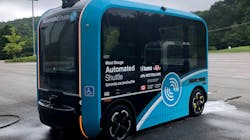Toronto’s West Rouge AV shuttle trial wraps on-road tests
The city of Toronto, Toronto Transportation Commission (TTC) and Metrolinx have ended the on-road portion of the West Rouge Automated Shuttle Trial in Scarborough a full month before it was originally supposed to conclude and without ever having served the public.
The partners pointed to several factors that led them to end the trial, including Local Motors’ cessation of operations in mid-January, which left the trial project without technical and operational support, as well as the Ontario Ministry of Transportation’s suspension of operational approval for the trial following an incident with a Local Motors shuttle involved in a separate autonomous vehicle trial in December 2021.
Despite ending the trial early, the city and its transit partners were able to test the autonomous shuttle for two months in the fall of 2021. The city says data was gathered on how automated vehicle technologies operate, their different requirements when compared to conventional transit vehicles, the current limitations of the technology and the range of solutions available in the market.
“The insights gained from the trial will support future decision-making and planning for automated vehicles in transit and the broader transportation system,” the city said in a release outlining why the trial ended.
The city signed an agreement with Local Motors in October 2020 to begin a six- to 12-month AV pilot program to evaluate the technology’s ability to meet unmet transit needs, such as last-mile connectivity. The trial, which was funded in part by a Transport Canada grant awarded to TTC and Metrolinx, supported Toronto’s plan to make the city ready for autonomous technology by 2022.
The West Rouge Automated Shuttle Trial’s project website explains the project was always designed to be temporary and defined its success based on two points: First, generating use of the shuttle by residents and gathering feedback on their experiences and second, developing a greater understanding of the AV technology, it’s potential for integration to fill certain gaps and whether this type of service would offer long-term customer benefits.
“The city, TTC and Metrolinx remain committed to finding innovative, accessible and sustainable transit solutions, including automated vehicle technology, to fulfill the future transportation needs of Torontonians,” the city explained.

Mischa Wanek-Libman | Group Editorial Director
Mischa Wanek-Libman is director of communications with Transdev North America. She has more than 20 years of experience working in the transportation industry covering construction projects, engineering challenges, transit and rail operations and best practices.
Wanek-Libman has held top editorial positions at freight rail and public transportation business-to-business publications including as editor-in-chief and editorial director of Mass Transit from 2018-2024. She has been recognized for editorial excellence through her individual work, as well as for collaborative content.
She is an active member of the American Public Transportation Association's Marketing and Communications Committee and served 14 years as a Board Observer on the National Railroad Construction and Maintenance Association (NRC) Board of Directors.
She is a graduate of Drake University in Des Moines, Iowa, where she earned a Bachelor of Arts degree in Journalism and Mass Communication.





